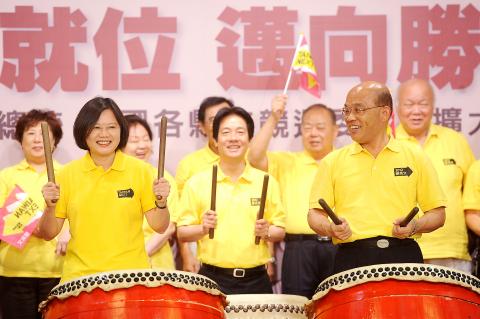Democratic Progressive Party (DPP) officials were in an exuberant mood at the party’s first national campaign meeting yesterday as Chairperson Tsai Ing-wen (蔡英文) said social issues, in particular income inequality, would be the central pitch of her presidential campaign.
“Today, Taiwanese society is calling on us again,” Tsai told hundreds of campaign officials at the meeting, saying that not only have the underprivileged suffered under President Ma Ying-jeou’s (馬英九) administration in the past three-and-a-half years, but the middle class has also been plagued by stagnant wages, high unemployment and poor industrial competitiveness.
In a nutshell, she said, most people are under the threat of poverty and income inequality.

Photo: Liu Hsin-de, Taipei Times
She proposed tax reforms that would make capital gains tax — rather than income tax — the major source of government revenue. The first step would be reforms to the real-estate transaction tax to stop property speculation, she said.
The DPP would also make good governance a central issue of the campaign, which Tsai said would be crucial to sustaining Taiwan’s democratic way of life, maintaining social justice and creating a sustainable environment.
The DPP always prides itself as being the party that “stands by the people,” she said, and despite the setbacks of the past few years, that spirit has never changed.
While the absence of former vice president Annette Lu (呂秀蓮), who is abroad, and DPP caucus whip Ker Chien-ming (柯建銘) raised some eyebrows, DPP officials looked confident after a two-hour discussion of the details of the campaign, from strategy to the division of labor.
They were briefed on a national opinion poll that showed that Tsai is leading Ma by a slim margin and the DPP gaining ground in northern and central Taiwan, which have traditionally been Chinese Nationalist Party (KMT) strongholds.
The DPP was satisfied with the progress and tempo of the campaign, said Lin Hsi-yao (林錫耀), a senior aide in Tsai’s office who is in charge of campaign operations.
The major task before the party’s national campaign headquarters is set up in Banciao (板橋), New Taipei City (新北市), in October will be grassroots-level organizational work in civic organizations, the private sector and religious groups, Lin said.
The campaign office will unveil its second campaign slogan, following the “Taiwan NEXT” slogan, very soon and it will highlight the poverty issue, he said.
Tsai shared the podium with former premiers Su Tseng-chang (蘇貞昌), Frank Hsieh (謝長廷) and Yu Shyi-kun, all of whom are expected to play important roles in the campaign, as well as other prominent party members.
As campaign chairman — more a symbolic position than a functional one — Su would be able to help Tsai a great deal by simply voicing his support, Lin said.
Hsieh will be in charge of mobilization and Internet campaigning, while Yu will be the campaign’s finance officer, he said.

AGING: As of last month, people aged 65 or older accounted for 20.06 percent of the total population and the number of couples who got married fell by 18,685 from 2024 Taiwan has surpassed South Korea as the country least willing to have children, with an annual crude birthrate of 4.62 per 1,000 people, Ministry of the Interior data showed yesterday. The nation was previously ranked the second-lowest country in terms of total fertility rate, or the average number of children a woman has in her lifetime. However, South Korea’s fertility rate began to recover from 2023, with total fertility rate rising from 0.72 and estimated to reach 0.82 to 0.85 by last year, and the crude birthrate projected at 6.7 per 1,000 people. Japan’s crude birthrate was projected to fall below six,

Conflict with Taiwan could leave China with “massive economic disruption, catastrophic military losses, significant social unrest, and devastating sanctions,” a US think tank said in a report released on Monday. The German Marshall Fund released a report titled If China Attacks Taiwan: The Consequences for China of “Minor Conflict” and “Major War” Scenarios. The report details the “massive” economic, military, social and international costs to China in the event of a minor conflict or major war with Taiwan, estimating that the Chinese People’s Liberation Army (PLA) could sustain losses of more than half of its active-duty ground forces, including 100,000 troops. Understanding Chinese

SELF-DEFENSE: Tokyo has accelerated its spending goal and its defense minister said the nation needs to discuss whether it should develop nuclear-powered submarines China is ramping up objections to what it sees as Japan’s desire to acquire nuclear weapons, despite Tokyo’s longstanding renunciation of such arms, deepening another fissure in the two neighbors’ increasingly tense ties. In what appears to be a concerted effort, China’s foreign and defense ministries issued statements on Thursday condemning alleged remilitarism efforts by Tokyo. The remarks came as two of the country’s top think tanks jointly issued a 29-page report framing actions by “right-wing forces” in Japan as posing a “serious threat” to world peace. While that report did not define “right-wing forces,” the Chinese Ministry of Foreign Affairs was

US President Donald Trump in an interview with the New York Times published on Thursday said that “it’s up to” Chinese President Xi Jinping (習近平) what China does on Taiwan, but that he would be “very unhappy” with a change in the “status quo.” “He [Xi] considers it to be a part of China, and that’s up to him what he’s going to be doing, but I’ve expressed to him that I would be very unhappy if he did that, and I don’t think he’ll do that. I hope he doesn’t do that,” Trump said. Trump made the comments in the context